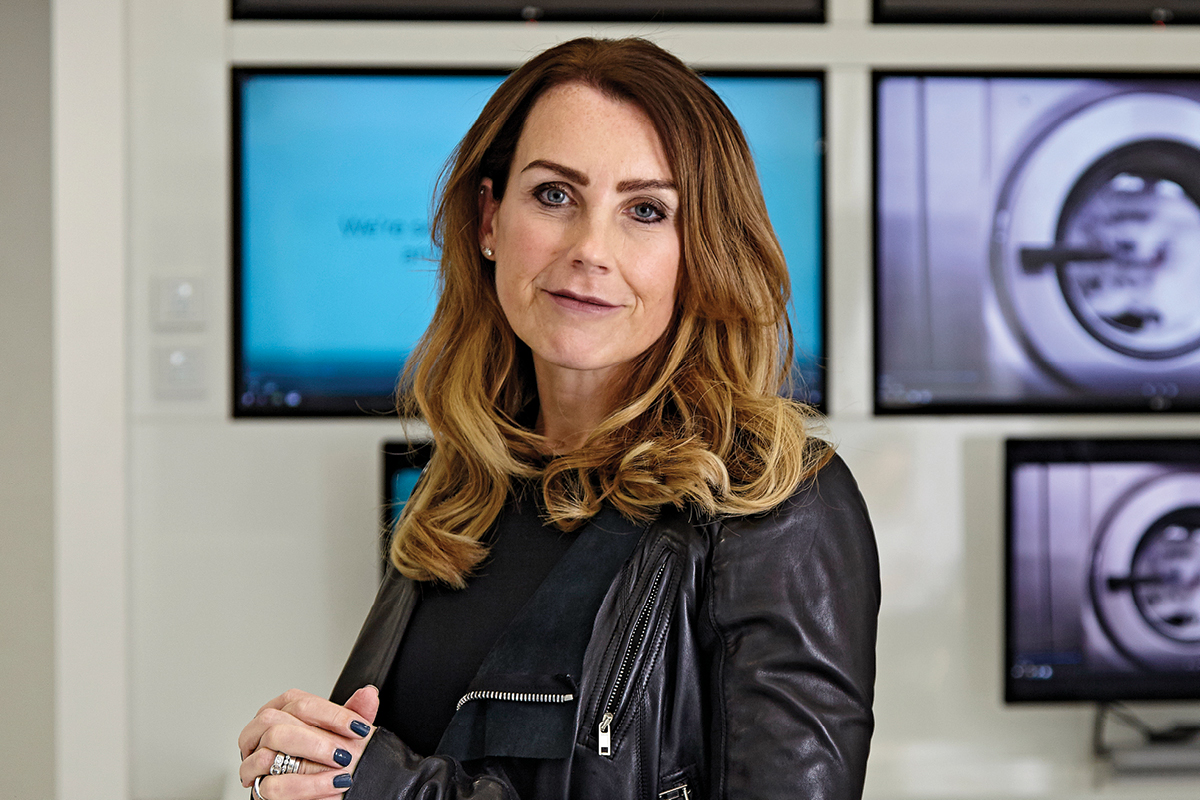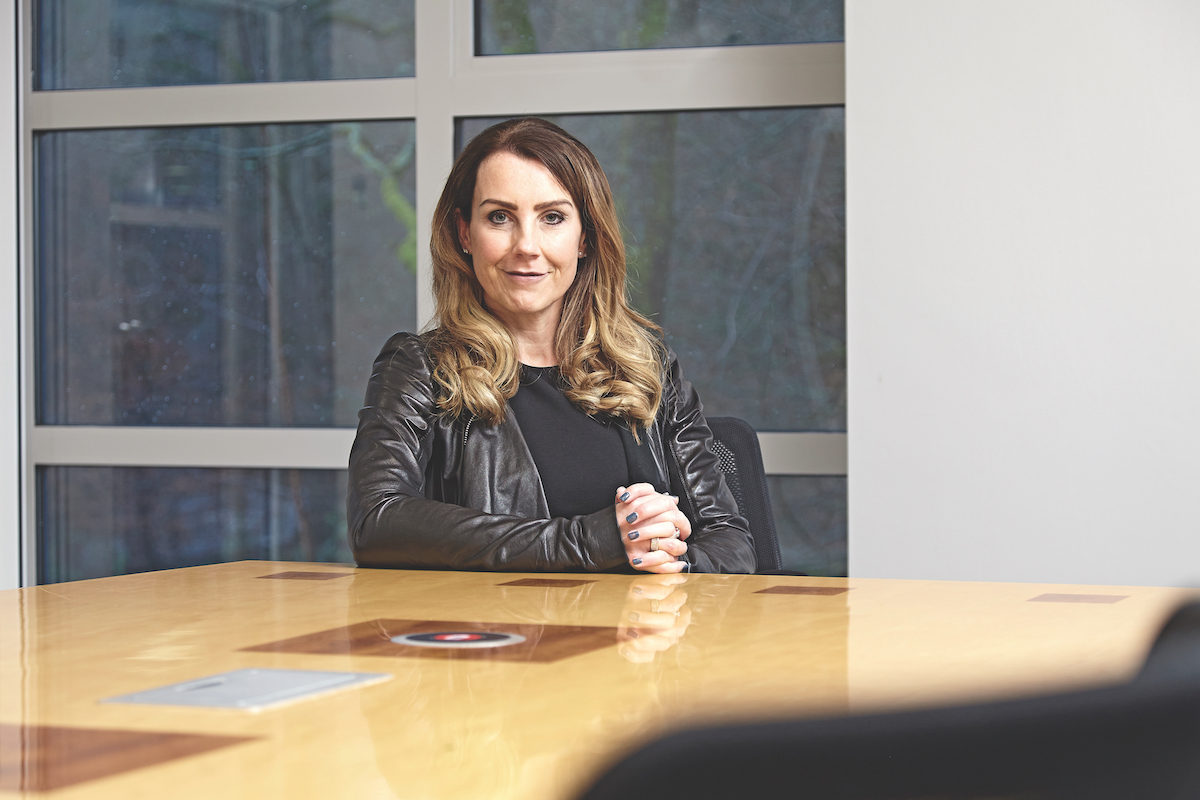In early 2019, Helen Ashton walked into JLA’s West Yorkshire headquarters for the first time to kick off her term as CEO of the company, which supplies and services critical equipment for small- and medium-sized businesses in several industries. Right at that moment, an unexpected feeling came over her – the feeling of being in exactly the right place at the right time.

“Throughout my career, it has been quite unusual to walk into an office and immediately sense that I’m home, to be able to identify an energy, a can-do attitude and a vibrancy in the atmosphere,” she recalls.
Her new job came with a touch of adventure. Located in the small village of Ripponden, JLA’s offices were a major change of scenery from the big-city nerve centres where she had spent her career up to that point, serving in executive roles at Barclaycard International, ASDA, Lloyds Bank and Capquest.
Most recently, she was CFO of retail giant ASOS. Fortunately, this tranquil setting turned out to be one of the most rewarding aspects of her new life.
“We have people here – the first five employees – who joined 40 years ago, when the business was first formed. There’s longevity to tenures, so the office has a real family feel,” Helen says.
“On the other hand, since the company is owned by private equity, there’s a very clear focus on growth. We have the perfect balance here. There are no politics and no wasting of energy on petty things. Everyone wants to cooperate to make decisions quickly and do the right thing for the business.”
Highly complex execution
Starting as a commercial laundry equipment distributor in 1973, JLA has undergone a series of transformations over the years that have allowed the company to expand throughout the UK and now, set its sights overseas.
In addition to laundry and catering equipment, which represent its two earliest product divisions, it has also taken on the heating, fire safety, air conditioning and lighting sectors.
Under its current business model, it provides a range of products to clients in various sectors and delivers fast, 24-hour on-call servicing for a monthly fee in a package known as Total Care.
“This business model is unique, and no other firm has managed to develop one that is as effective in assuring continuity and certainty to its customers,” Helen says. “Our proposition may appear simple, but its execution is highly complex.”
“This business model is unique, and no other firm has managed to develop one that is as effective in assuring continuity and certainty to its customers.”
This is due to the diversity in the products JLA provides, and the varied sectors its serves. The company works with care homes, medical facilities, educational institutions, and businesses in the hospitality industry.
“The equipment we provide is critical to these SMEs, and by critical, I mean that these are items they cannot operate without. So, if a customer has any problems with a JLA machine, it is important that we can get it up and running as soon as possible. Our service-level agreements (SLAs), which are as short as four hours, are industry-leading. Our customers trust us to keep their critical equipment working. We provide the peace of mind they need to succeed,” Helen says.

Ensuring such quick, high-quality maintenance for machines located across the UK requires JLA to employ a nationwide network of customer service specialists, operations managers and engineers trained in installing and repairing a wide array of equipment. Managing this network is one of the main challenges of Helen’s work.
“The reason recruitment is tricky for us is because we don’t just need people who have a particular technical skill. What we need are employees who have the emotional intelligence to collaborate in a team and who understand what it means to be working in an agile fashion,” she says.
“With strong competition, changes in global economies and regulations, businesses need to be nimble in order to survive. Therefore, recruiting and retaining talent who thrive despite ambiguity and can keep ahead of the curve is important.”
When the right people are put together, the organisation runs like a well-oiled machine, which is why Helen is happy to trust her team with responsibilities. “My role is about coaching and allocating resources to equip our people with what they need to go out and build the business.”
Plans for expansion
With more than 25,000 customers and counting, JLA today is focused on expansion, both geographically and in its products and services.
In 2018, the company opened its fire safety division, offering fire doors, fire alarms, automatic opening vents (AOVs), extinguishers and emergency signage, as well as fire risk assessments and training to businesses. This development came at a crucial time in the UK, when public interest in fire safety was at an unprecedented high.
“There had been a number of high-profile incidents in the country with buildings that just weren’t constructed to the standard that they should have been to protect people from fires,” Helen says.
“I think there is now a lot of political and regulatory pressure to invest in fire safety measures, and I suspect that these regulations will continue to tighten over time. There aren’t many large players that provide great fire safety services, so we see a real opportunity to build this segment of our business.”
In addition to new product divisions, JLA is also eyeing countries to move into, primarily in Europe. Helen says this expansion will follow the same strategy JLA took to grow within the UK – using laundry services as a foothold in a location before introducing the other product lines.
“We will always look to enter a market via acquisition instead of aiming for organic growth, and a good market would be one that has lots of social housing, because they tend to come with washing machines. At the moment, we are planning to acquire businesses and then work with them to implement our Total Care model before branching out further,” she says.
“We are growing quickly in the UK. Soon, we are hoping to see the same success in Europe, and then in the US and Asia.”
“Our customers trust us to keep their critical equipment working. We provide the peace of mind they need to succeed.”
Staying true to its roots
JLA may be thinking big when it comes to geographical expansion and product diversification, but the firm will always be more than happy to support the SMEs that are its main clientele.
“Our company has naturally grown from serving small and medium businesses; we don’t often deal with larger corporations. I believe it may be because bigger companies tend to have the practice of negotiating with procurement teams that are very focused on cost,” Helen explains.
“But I think even these larger businesses are starting to recognise that getting value for money is not just about the cost. Equally important are the quality of the services, the assets and the relationship.”
This is why, she says, JLA often gets customers who have left coming back. “They may have been pulled away by more attractive pricing, but they tend to return when they realise that what they were paying with us was worth it.” She is optimistic that the industry will gradually move away from price competition.
“JLA will never be the cheapest in the market, but we will always work to make sure that we are great value for money.”
Proudly supported by:



